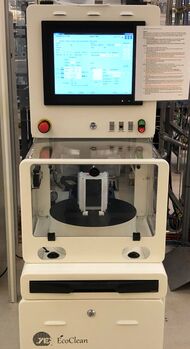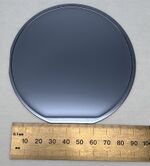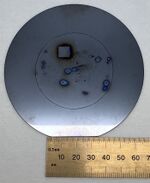Difference between revisions of "Plasma Clean (YES EcoClean)"
(→Etch Method: mentioned back of wafer exposure to gas) |
|||
| (10 intermediate revisions by 4 users not shown) | |||
| Line 1: | Line 1: | ||
| − | {{ |
+ | {{tool2|{{PAGENAME}} |
| − | |picture= |
+ | |picture= IMG_5385.JPG |
|type = Dry Etch |
|type = Dry Etch |
||
| − | |super= Lee Sawyer |
+ | |super= Lee Sawyer |
| + | |super2= Aidan Hopkins |
||
| − | |phone=(805) 893-2123 or (805) 893-3096 |
||
|location=Bay 5 |
|location=Bay 5 |
||
| − | |email=lee_sawyer@ucsb.edu or silva@ece.ucsb.edu |
||
|description = EcoClean Asher |
|description = EcoClean Asher |
||
|manufacturer = [https://www.yieldengineering.com YES] |
|manufacturer = [https://www.yieldengineering.com YES] |
||
| Line 12: | Line 11: | ||
==About== |
==About== |
||
| + | The YES EcoClean system is an ICP downstream asher used for the removal of resist and other organics. |
||
| − | The YES EcoClean system is an ICP downstream asher used for the removal of resist and other organic. 4" wafers are cassette loaded or smaller samples are loaded onto 4" carriers into the system. Samples can be heated from ~120C to 200C by controlling the sample height via the lift pins during process, while being exposed to ICP-cracked oxygen to remove organic materials. The excitation of the oxygen is done remotely and a baffle keeps ions from reaching the surface. Radicals diffuse and are scattered across the wafer surface for efficient cleaning and PR removal without any ion damage. Resist etch rates of multiple microns per minute can be achieved. See the process pages below for etch recipes for various resist removal recipes. |
||
| + | 4" wafers are cassette loaded or smaller samples are loaded onto 4" carriers into the system. |
||
| + | Samples can be heated from ~120°C to 200°C by controlling the sample height via the lift pins during process, while being exposed to ICP-cracked oxygen to remove organic materials. |
||
| ⚫ | |||
| + | ===Etch Method=== |
||
| ⚫ | |||
| + | The excitation of the oxygen is done remotely and a baffle keeps charged ions from reaching the surface, leaving primarily neutral Oxygen radicals in the gas mixture. Radicals diffuse and are scattered across the wafer surface for efficient cleaning and PR removal without any ion damage. This behaves like a wet-etch with reactive Oxygen. No ion bombardment at all, so isotropic (omni-directional) etch - attacks sidewalls just as fast as top surfaces. Heat is used to increase reaction rate. Treat this as a purely chemical process, accelerated by heat (Arrhenius plot - rate goes up exponentially with temperature). |
||
| + | |||
| + | Note that our recipes use a lift-pin to adjust temperature quickly, with hotplate always set to 200°C (constant). This means that the ''back'' of the wafer is exposed to the reactive gas for temperatures <200°C (when wafer is lifted). |
||
| + | |||
| + | ===Applications=== |
||
| + | Resist etch rates of multiple microns per minute can be achieved. |
||
| + | |||
| + | Use this where you know a purely chemical etch will suffice, for example PR etching. PR stripping is fast and cassette loaded. Works best for PR that hasn't been significantly changed (eg. Chlorinated, or Polymerized - in these cases some small residue can be left.) - follow up with [[Ashers (Technics PEII)|PEii Technics]] etch to remove more stubborn residues. |
||
| + | |||
| + | See the process pages below for etch recipes for various resist removal recipes. |
||
| + | |||
| + | ===Detailed Info=== |
||
| + | The following carrier wafers are available, with depressed etched pockets to prevent samples from sliding of the carrier. |
||
| + | {| class="wikitable" |
||
| + | |[[File:YES Pocket Carrier Wafers - 90mm pocket.jpg|alt=YES Ecoclean carrier wafer - Image of etched silicon wafer with raised edge.|none|thumb|166x166px|~90mm carrier wafer with raised edge.]] |
||
| + | |[[File:YES Pocket Carrier Wafers - 50mm pocket.jpg|alt=YES Ecoclean carrier wafer - Image of etched silicon wafer with raised edge and 50mm pocket.|none|thumb|183x183px|50mm carrier wafer]] |
||
| + | |} |
||
| + | Please the '''''Recipes''''' page linked below for important info on preventing oxidation of certain metals, and which recipes to run to prevent that. |
||
==Documentation== |
==Documentation== |
||
| − | *[https:// |
+ | *[https://wiki.nanotech.ucsb.edu/w/images/7/7e/YES_SOP_Rev_E.pdf YES Plasma Strip System Standard Operating Procedure] |
| ⚫ | |||
| + | |||
| + | ==Recipes== |
||
| ⚫ | |||
| + | |||
| + | *''Note this page lists important process info regarding the availableO2, N2/O2 recipes and oxidation of certain metals.'' |
||
Latest revision as of 12:31, 22 November 2023
| ||||||||||||||||||||||||||
About
The YES EcoClean system is an ICP downstream asher used for the removal of resist and other organics.
4" wafers are cassette loaded or smaller samples are loaded onto 4" carriers into the system.
Samples can be heated from ~120°C to 200°C by controlling the sample height via the lift pins during process, while being exposed to ICP-cracked oxygen to remove organic materials.
Etch Method
The excitation of the oxygen is done remotely and a baffle keeps charged ions from reaching the surface, leaving primarily neutral Oxygen radicals in the gas mixture. Radicals diffuse and are scattered across the wafer surface for efficient cleaning and PR removal without any ion damage. This behaves like a wet-etch with reactive Oxygen. No ion bombardment at all, so isotropic (omni-directional) etch - attacks sidewalls just as fast as top surfaces. Heat is used to increase reaction rate. Treat this as a purely chemical process, accelerated by heat (Arrhenius plot - rate goes up exponentially with temperature).
Note that our recipes use a lift-pin to adjust temperature quickly, with hotplate always set to 200°C (constant). This means that the back of the wafer is exposed to the reactive gas for temperatures <200°C (when wafer is lifted).
Applications
Resist etch rates of multiple microns per minute can be achieved.
Use this where you know a purely chemical etch will suffice, for example PR etching. PR stripping is fast and cassette loaded. Works best for PR that hasn't been significantly changed (eg. Chlorinated, or Polymerized - in these cases some small residue can be left.) - follow up with PEii Technics etch to remove more stubborn residues.
See the process pages below for etch recipes for various resist removal recipes.
Detailed Info
The following carrier wafers are available, with depressed etched pockets to prevent samples from sliding of the carrier.
Please the Recipes page linked below for important info on preventing oxidation of certain metals, and which recipes to run to prevent that.
Documentation
Recipes
Recipes > Dry Etching > Oxygen Plasma > YES Ecoclean Recipes
- Note this page lists important process info regarding the availableO2, N2/O2 recipes and oxidation of certain metals.


